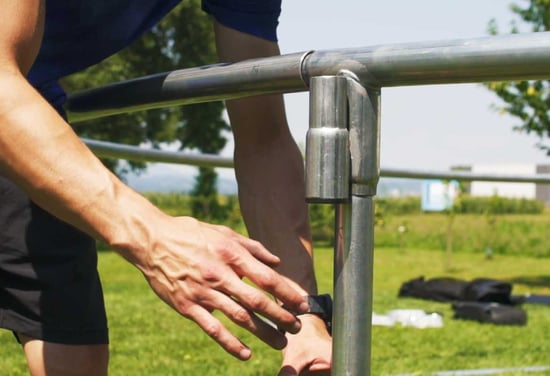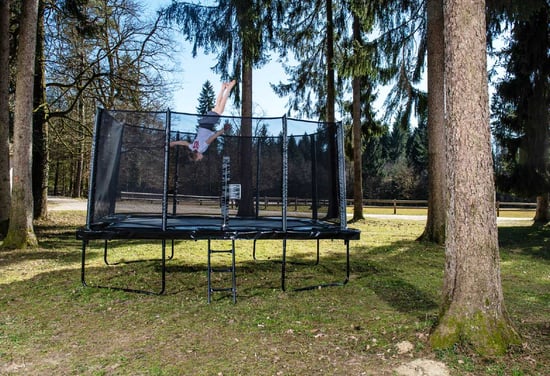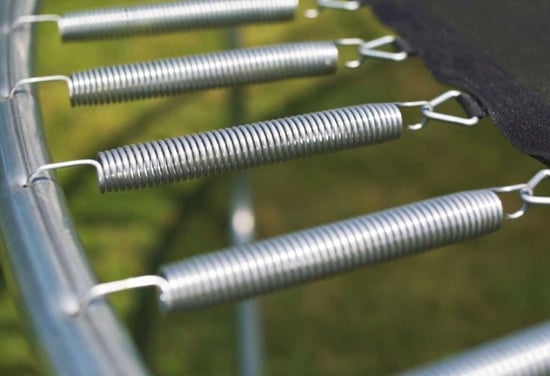Discussions about the quality of a trampoline should always include the subject of stability. This is one of the key features of a trampoline, which has a significant impact on its safe use and lifespan.
A stable trampoline is difficult to move or push off balance, which means you can use it without worrying. The stability of a trampoline refers primarily to its frame and setup, which together ensure that the trampoline does not move during use.
What affects the stability of a trampoline?
The frame is an integral part of any trampoline, which ensures proper stability. You can avoid a number of problems if you pay close attention to several factors concerning stability when choosing your model:
- Frame quality: A durable and robust frame can easily withstand the heaviest loads. This also means it will maintain its stability for longer. Make sure the frame is made of stainless and galvanized steel, as this makes it optimally resistant to rusting and other damage that increases the instability of the trampoline.
- Frame design: As a rule, trampolines with more legs are more stable, as the loads are distributed more evenly. It’s also important that the frame is designed with a minimum number of screws that could loosen and cause instability, so choose a frame that allows connecting all its different parts as easily and securely as possible.
- Proper setup: The stability of the trampoline is also greatly influenced by the proper setup of the frame. The key is placing the trampoline on a flat surface, following all the manufacturer's instructions, and taking no shortcuts.
- Respecting the weight limit: Trampolines have a weight limit for a reason and ignoring it will make the trampoline wobbly sooner rather than later. It’s thus vital for the stability of the trampoline that it’s used by only one user at a time, whose body weight corresponds to the weight limit of the trampoline.

Trampoline stability – why is it important?
As mentioned before, the stability of a trampoline is important because it provides the user with a stable surface to push off and bounce on while jumping. It’s also important for the following reasons:

Safe and carefree trampoline use
Because jumping on a trampoline generates great forces, it’s crucial that the trampoline is stable enough to withstand these. If the trampoline moves then this will affect the jumper’s confidence while performing various tricks, as well as bringing other dangers. The most common risks include various injuries in addition to the ever-present fear of the trampoline tipping over while the user is jumping.
A long service life
The stability of the trampoline ensures that the frame keeps its shape even under the heaviest loads. This means that all its components are firmly connected to each other, making any damage less likely. You’ll be able to use a stable trampoline for much longer than a trampoline that wobbles.

A stable trampoline is best able to withstand extreme weather conditions
You've probably seen a trampoline that’s toppled over in a neighbor's garden. One of the great dangers to your trampoline, if it’s not stable or properly positioned, is extreme weather conditions, such as wind.
An overturned trampoline is the least that can happen to you in such situations, as the consequences can be much worse. Severe weather can cause serious damage to your trampoline and in extreme cases, the trampoline can fly into the air and get damaged beyond repair when it lands on the ground. So always check your trampoline to make sure it’s stable enough to withstand even the harshest winds.
What to do if the trampoline is unstable?
If you notice that your trampoline is wobbly or the frame is bent, you shouldn’t use it. These two signs can be serious indicators of instability, and the causes should be identified first:
- make sure the trampoline is on a flat surface,
- thoroughly check the frame for any damage,
- check the joints between the individual parts of the trampoline.
Only when you’ve eliminated all the causes of instability is the trampoline safe to use again.
For safe and worry-free use of your trampoline, be sure to keep stability in mind – it’s an extremely important feature of any trampoline!

